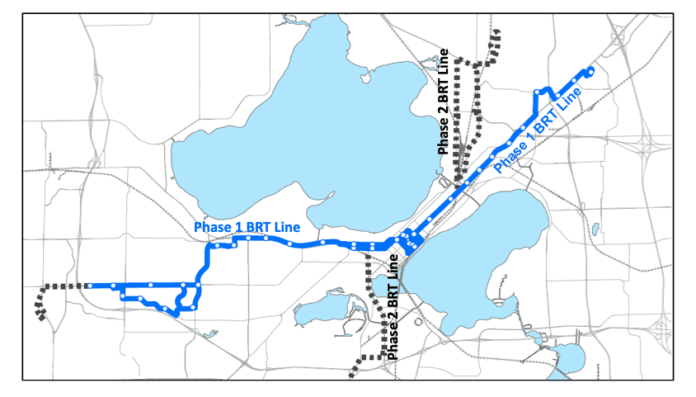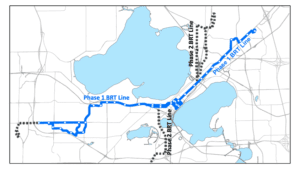During the budget discussion on the wheel tax, they kept talking about all the studies that would be done for BRT. Here’s a look at the what is expected from the study about changing our bus routes to complement BRT.
HOW MUCH WILL IT COST?
This has a strange fiscal note. It’s not at all clear how much they plan to spend on this study. $1 million? $2 million? 3 million?
Fiscal Note – The 2020 Adopted Capital Budget includes $4.0 million in the Transportation budget for Bus Rapid Transit (BRT). In 2020, funding will be used for planning and design associated with BRT. A component of this work is completion of a route analysis regarding Metro’s existing service. It is anticipated there will be no additional appropriation required to award this contract once the RFP process is completed.
VERY SHORT RESOLUTION
WHEREAS the City of Madison is advancing into the federal Project Development process for implementing the Phase 1 East-West Bus Rapid Transit (BRT) project, and there is a need to evaluate and coordinate how the many local bus routes serving the City will interact with the BRT line; and,
WHEREAS the project will include provision of options that are guided by a variety of goals and objectives as detailed in the scope of work; and,
WHEREAS the scope of work for the project will include an evaluation of several transit network alternatives, an identification of how various transit customers would benefit or be impacted by the alternatives, an identification of how the network alternatives affect underserved neighborhoods and communities of color, a projection of how ridership would vary under the alternatives and an identification of any infrastructure costs associated with the alternatives;
NOW THEREFORE BE IT RESOLVED that the Department of Transportation is authorized to issue an RFP for a Metro Transit Network Structure Study; and,
BE IT FINALLY RESOLVED that the RFP process and Metro Transit Network Structure Study will be administered by the Department of Transportation which will make regular reports to the Transportation Policy & Planning Board.
SCOPE OF WORK
Project Summary
The selected consultant will guide the city through the process of evaluating its transit system and recommending changes. This work will consist of transit system planning, data analysis, and outreach and communication with policy- makers, the public, and staff.
The city is planning to implement its first bus rapid transit (BRT) line, with revenue service starting as early as 2024. Information regarding the Phase 1 line can be found at www.madisonbrt.com. The planned Phase 2 is a second north- south line to be completed soon after. The City of Madison has budgeted for a full transit system review and potential restructuring of its routes.
This project will evaluate the utility of the transfer point system and potentially recommend alternatives.
The goals of the project will be defined in the early stages of the project; however, the overall objective is increase mobility for people, increase ridership, reduce travel times, and make the system easier to use. Draft project goals developed for the purpose of this RFP, are shown below.
- Simplify service by reducing the number of overlapping routes
- Concentrate service onto high-demand arterial corridors with frequent service
- Reduce the number of transfers for underserved and disadvantaged people
- Streamline service to reduce travel times and improve frequency
- Complement east-west BRT – reduce duplication and maximize connections, and set the stage for north-south BRT
- Reduce the peak-to-base ratio, improving mid-day service and reducing the number of buses required.
- Provide better late-night and weekend service.
Draft Scope of Work
1. Project Management and Administration
This task covers internal meetings, scheduling, billing, and other project management needs.
2. Community Engagement
The Consultant shall develop and perform a community engagement program that:
- Educates policy makers on the fundamentals of transit system development and incorporate direction from them particularly on establishing priorities and choosing a recommended alternative.
- Gathers feedback from policy makers on service priorities.
- Engages the community and transit riders to obtain feedback and provide information on alternatives.
- Provides information and a framework for policy makers to make a decision.
Special efforts and methods are encouraged to reach underserved communities. The Consultant shall make site arrangements for engagement activities and provide materials and presentations necessary for the engagement activity. Community engagement is intended to be a continuous effort throughout the project. It is anticipated that this effort will be most active when developing alternatives and recommendations.
3. Data Assemblage and Analysis
The Consultant shall assemble existing data provided by the CITY and analyze the current state of the system for boardings, ridership, transfers, and revenue. Information provided by the City will include:
- Route and schedule data
- 2015 On-board survey
- Estimated boardings by bus stop
- Ridership and revenue hours by route
- On-time performance data
- Metro Title VI Plan
Collection of additional data not provided by the City shall be considered “Extra Services”. The analysis shall provide defining characteristics of the current system, including strengths and weaknesses.
4. Developing Alternatives
The Consultant shall develop three transit system alternatives with an option to develop a fourth alternative if authorized by the City. The alternatives should assume the planned east-west BRT line is in place. Parameters for the alternatives include:
- The system alternatives should be revenue neutral, absent extra operating expenses incurred from BRT.
- The system alternatives should focus on the existing service area. The Consultant may suggest changes to the service area prior to alternative development if there are clear advantages.
- The system alternatives should focus on Routes 1 through 78.
- The alternatives should provide a reasonable range of emphasis, from frequency to coverage.
- The alternatives should be developed to the level of detail necessary to make service change decisions.
The Consultant may suggest refinements to the BRT Phase 1 and 2 routing. The Consultant shall provide a framework for alternative implementation that recognizes system changes may occur prior to BRT implementation.
5. Alternatives Evaluation
The Consultant shall evaluate the system alternatives in reference to the existing system. At a minimum the evaluation shall include the following:
- Emphasis of the proposed alternative with regards to coverage and frequency
- Users expected to benefit and be impacted from the proposed alternative
- Effects of the proposed alternative on underserved neighborhoods and communities of color
- Anticipated ridership effects of the proposed alternative
- Infrastructure costs
6. Documentation
The Consultant shall prepare and submit a report that documents:
- Existing system needs
- System alternatives
- Evaluation
- Public engagement
- Recommendation and/or selected alternative
- Implementation framework
The Consultant shall prepare a brochure that summarizes the analysis and the recommendation and/or selected alternative. The Consultant shall prepare a slide presentation that summarizes the analysis and the recommendation.
THOUGHTS ON THE SCOPE OF WORK
Public Input
Um, 3 of the 4 bullet points about public engagement are about policy makers. Check it out.
- Educates policy makers on the fundamentals of transit system development and incorporate direction from them particularly on establishing priorities and choosing a recommended alternative.
- Gathers feedback from policy makers on service priorities.
- Engages the community and transit riders to obtain feedback and provide information on alternatives.
- Provides information and a framework for policy makers to make a decision.
Hmmmmm.
Revenue Neutral?
I’m real curious what exactly this means:
- The system alternatives should be revenue neutral, absent extra operating expenses incurred from BRT.
Does that mean the fairbox needs to cover all the costs? It currently doesn’t. And how do they determine what costs are due to BRT and which aren’t?
Refinements to BRT Phase 1 and 2?
- The Consultant may suggest refinements to the BRT Phase 1 and 2 routing.
Just pointing that out.
OPPORTUNITIES TO WEIGH IN THIS WEEK
This will be at the Finance Committee tonight and the Transportation Commission on Wednesday.
Monday, February 10 – 4:30 PM Finance Committee Madison Municipal Building 215 Martin Luther King, Jr. Blvd, Room 215 Madison, WI 53703
Wednesday, February 12 – 5:00 PM Transportation Commission Madison Municipal Bldg 215 Martin Luther King Jr Blvd, Room 215 Madison, WI 53703










I was having difficulties seeing the difference between the proposal and what was done this past year, but the evaluation of the transfer point system and the overall evaluation of the route structure are more ambitious than the previous study, which was started under Soglin’s administration.
Metro staff seemed to be more in the driver’s seat during the last study, which concerned me because I feel they never understood just how inconvenient and overcomplicated the system was for a lot of riders. During the meetings last year I was surprised that they wanted to keep the transfer points when it was obvious to me that each stop on the BRT should be a transfer point. Staff bristled when I voiced my concern that the current system was too complicated even for regular riders much less new ones.
The mayor has always played her cards close when it has come to her opinions about current Metro service. This evaluation should have perhaps been done last year but wasn’t, probably because staff who thought the current system was just fine were heavily involved in last year’s studies. Having someone from the outside evaluate the system could help overcome inertia and hopefully better cultivate a sense of customer service from Metro. I have always felt Metro could get more riders just by making such improvements with the current system. Maybe I’m reading my own desires and concerns into the current proposal, but if I’m interpreting it correctly I think it would be a welcome development before we start spending money on infrastructure.
Also I think the “revenue neutral” route changes is meant to talk about the possibility of changing service on a given route without increasing costs for that route.